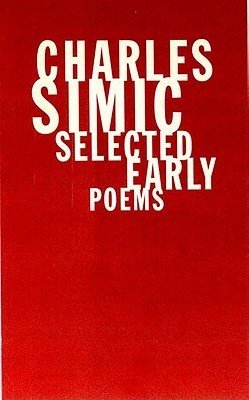What do you think?
Rate this book


264 pages, Paperback
First published January 1, 1999
ForkIt is interesting to see Simic toy with form in this collection, playing with line breaks and structure in ways unseen in his later works when he had a clear sense of his own style. What is most assuring about this collection is to see that even from his humble beginnings (in his introduction, Simic points out that the poems Butcher Shop and Cockroach were the first two poems he felt proud enough of to show to others) Simic had a voice all of his own. I have recently read Bukowski’s collection Burning in Water, Drowning in Flame which contains much of his earliest work as well. As a contrast to this, Burning only shows sparks of an original voice in the earlier poems (not that the poems are bad, but mostly generic and without a unique voice letting them ring out beyond a quagmire of influences), and shows Bukowski attempting to be poetic instead of just merely letting the poetry flow. Here too, however, Simic seems to be trying to control his poetry as if it were a dog on a leash that he keeps tugging in the direction he desires instead of letting the poem run free and trusting it to make it home safely at the end of the day like he does in his later work.
This strange thing must have crept
Right out of hell.
It resembles a bird’s foot
Worn around the cannibal’s neck.
As you hold it in your hand,
As you stab with it into a piece of meat,
It is possible to imagine the rest of the bird:
Its head which like your fist
Is large, bald, beakless, and blind.
endless tinkering...they depend for their success on the placement of words and image in proper order, and their progression duplicates the inevitability and surprise of an elegantly executed checkmate.Particularly humorous is his confession that he wrote poetry as a young schoolboy primarily as an art of seduction, and wrote in English instead of his native tongue since ‘no American girl was likely to fall for a guy who reads love poems to her in Serbian as she sips a Coca-Cola.’
